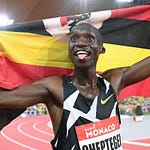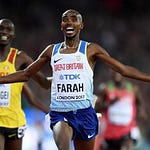We’re back with our roundup of our five favourite stories from the week. We’ve created two ways for you to get all caught up: skim through the stories below, or listen to our podcast (you can just stream it right here by pressing play👆). You can now also subscribe wherever you get your podcasts!
Here are the links to subscribe to the pod:
Topic #1: Sir Mo goes back to the track
Sitting in the stands at the World Championships in Doha this past September, Mo Farah watched Joshua Cheptegei of Uganda stride to victory in the 10,000m. The performance struck a competitive chord in the 36-year-old UK athlete as, on Friday, Farah announced that he will be returning to the track to defend his 10,000m title at the Tokyo 2020 Olympics.
Farah, a world-beater who clinched titles in both the 5,000m and 10,000m at London 2012 and Rio 2016, retired from the track in 2017, deciding, instead, to take a crack at the marathon. Over the past two years, he’s seen relative success on the roads, running 2:05:11 to win the 2018 Chicago Marathon, setting a European Record. The kind of success he had on the track, however, has eluded him.
Why this matters
It’s difficult not to view Farah’s sudden shift in gears as an attempt to reclaim his former glory. While his marathon results have been respectable, he’s not even in the conversation when compared to Eliud Kipchoge and Kenenisa Bekele—not to mention the long list of other East Africans slotted into the low two hour range.
Watching in Doha obviously stirred some deep-seated desires to once again don the laurel wreath and be lauded as Great Britain’s hero...Not that we’re complaining. Farah is an exciting athlete to watch. His legendary last laps are blistering. By reinserting himself into the 10,000m, it can only make for a better race.

What to look for next
In order to qualify for the Olympics, Farah must run 27:28 in the 10,000m by June 21. A seemingly easy feat considering his personal best is 26:46. He will, however, be 37 years old next year, going head-to-head with young guns like Joshua Cheptegei who is only 23 and has run 26:48 for 10,000m.
In the past, Farah somehow managed to dictate the pace and strategy of championship races, keeping them relatively slow and then unleashing a ferocious kick, closing his last 400m in 53 to 54 seconds. But, looking to 2020, you have to wonder, has age and marathon training robbed him of his finishing speed? It’s clear Farah is fit, but the 10,000m in Tokyo is going to take a whole other gear to win.
Topic #2: WADA wants Russia to face new four-year Global Sports Ban (yes, that includes the Olympics)

The World Anti-Doping Agency has recommended that Russia face a newfour-yearbanfrom world sports, and that the ban be in effect before the 2020 Tokyo Olympic Games.
The background
Russia’s anti-doping labs and personnel came under fire when Brian Fogel’s Academy Award-winning documentary Icarus serendipitously exposed one of the biggest doping operations in the history of sport. In 2016, former head of Russia’s anti-doping laboratory Grigory Rodchenkov admitted to The New York Timesthat he had helped create and operate a state-sponsored doping program during the 2014 Sochi Games. Rodchenkov then fled the country and lives in hiding, somewhere in the United States.
As part of the resolution of the 2016 doping case, Russia agreed to provide a set of testing results to doping regulators from its Moscow laboratory. Russian officials are now accused of manipulating data from these results, and face a multiple-year penalty.

Grigory Rodchenkov, left, shares his doping knowledge with filmmaker Bryan Fogel in 2016
Why it matters?
If the IOC imposes a ban, Russian athletes will once again have to compete under the Olympic Athletes of Russia (OAR) neutral flag, like they did at the 2018 Pyeongchang winter games. If a blanket ban is imposed, no athletes from Russia will get to compete in Tokyo at all, under a neutral flag or otherwise.
The suggested timeframe for the ban is four years. So, it is possible that a ban would also affect Russia’s participation at the 2024 Olympic Summer Games in Paris.
What’s next?
Anti-doping officials from around the world, like USADA chief executive Travis Tygart, urge Russia’s banishment from Olympic sport. Thomas Bach, chair of the IOC, strongly favours case-by-case athlete testing, and so far has fought against the prospect of a blanket ban.
A final ruling is expected for December 9, when WADA board members meet in Paris. Any decision made at the meeting would be subject to appeal at the Court of Arbitration for Sport.
Topic #3: 17-year-old Kenyan booked for doping
Angela Ndungwa Munguti, a teenager from Nairobi, was given a four-year ban by the Athletics Integrity Unit (AIU) on Wednesday after one of her samples tested positive for Norandrosterone, a metabolite of anabolic steroid Nandrolone. The sample was taken on October 7, 2018 during an out-of-competition doping control program at the Summer Youth Olympics in Buenos Aires.
Munguti, a silver medallist in the 800m (2:06.21) at the 2018 African Youth Games, is the 43rd Kenyan to be banned for doping this year. This has been a growing trend among Kenyan athletes with notable names like 2008 Olympic 1,500-meter champion Asbel Kiprop, 2016 Olympic marathon winner Jemimah Sumgong and former Boston and Chicago Marathon winner Rita Jeptoo banned for anti-doping rule violations.

Rita Jeptoo
Why this matters
The AIU was founded by the International Association of Athletics Federations (IAAF) in April 2017 as a way of combating doping in athletics. The organization operates independently of the IAAF and appears to be doing a pretty thorough job, cracking down on nations like Kenya that have been notoriously difficult to police.
The number of Kenyans banned for doping violations this year brings into question how inherent banned substance use is among athletes in the country, especially now that a teenager has been caught. These bans will majorly impact the team Kenya fields in Tokyo next year, sapping the country of many of its top runners.

Asbel Kiprop
What to look for next
Kenya’s running culture is notoriously competitive. Athletes use the sport to secure lucrative scholarships to American universities, sponsorship deals, and citizenship in other countries. It’s possible Munguti felt pressure to succeed, securing steroids as a way of getting an edge on her competition. But as a 17-year-old, it seems unlikely she would be the one purchasing Norandrosterone. So, where did she get it from? A coach? An older athlete? An agent?
While her decision to use a performance enhancing drug certainly can’t be condoned, a scarier thought is that there’s possibly coaches in Kenya who are providing underage athletes with steroids. If this is the case, does Kenya have the infrastructure to stop it or the media coverage to expose it? In North America, when young athletes like Mary Cain are abused, people notice (eventually). But when young athletes in Kenya are exploited or abused, does anyone notice?
Topic #5: A Japanese woman runs sub-3 hours in the marathon😲
Mariko Yugeta, 61, became the first woman to ever crack three hours over the age of 60. Earlier this month, she ran 2:59:15 at the Shimonoseki Kaikyo Marathon, breaking the previous age group world record by over three minutes.
When a local TV station attempted to chase her down for an interview, she was literally in the midst of a workout, so… they had to watch her do repeats before getting the interview.
Shout out to Brett Larner and his fantastic English-language reporting on the Japanese running scene. Read the original article here (via Japanese site Runnet.jp).
Topic #5: Canadian XC Nationals (ACXC) - Our Picks 🇨🇦
The Canadian cross-country national championship will have happened by the time you read this, in Abbotsford. B.C. The senior fields are quality over quantity - only 50 women and 100 men will face off for national glory, bragging rights, and a spot on Team Canada at the 2020 Pan American Cross-Country Cup.
Since we recorded the pod before the race, you get to listen to our bold predictions with the knowledge that Geneviève Lalonde and Mike Tate are you 2019 Canadian Cross-Country champs!
Nevertheless here were our picks to win, and why:
The Women:
Geneviève Lalonde headlines a short list of medal contenders. The 2016 Olympian from Moncton, N.B. is the ACXC defending champion, and was a 3000m steeplechase finalist at this year’s World Athletics Championships in Doha. She will be challenged by Vancouver's Natasha Wodak, last year’s runner up and the 10,000m gold medalist at the 2019 Pan American Games. Victoria Coates of Hamilton, who was second in 2017, will also be in the running for gold - she has posted a half-marathon time of 1:12:36 earlier this year.

Photo: 365 Kingston
Michael’s picks
Winner: Natasha Wodak
Dark horse: Victoria Coates
Andrew’s picks:
Winner: Geneviève Lalonde
Dark horse: Victoria Coates
Alex’s picks
Winner: Geneviève Lalonde
Dark horse: Victoria Coates
The Men
Luc Bruchet of Vancouver is the two-time defending champion and hopes to complete the turkey at home this year. The 2016 Olympian has been plagued with injury in the last calendar year, but his vlog from last month indicates that he is ready to roll (we think).
Bruchet will be challenged by a few young men. Last year, Mike Tate of Antigonish, N.S., now training in Guelph, gave Bruchet a run for his money and finished second. The 24-year-old Tate is fit this year - he cruised to a 14:00 at the Run Waterloo Fall Classic 5k, and is coming off a bronze medal finish at the Canadian national 1,500m final. 23-year-old Ben Preisner of Milton won the Toronto Half-Marathon last month in a time of 63:08.
Michael’s picks
Winner: Luc Bruchet
Dark horse: Mike Tate
Dark, dark horse: Chris Balestrini
Andrew’s picks:
Winner: Luc Bruchet
Dark horse: Rob Denault
Alex’s picks
Winner: Mike Tate
Dark horse: Connor Black













Share this post